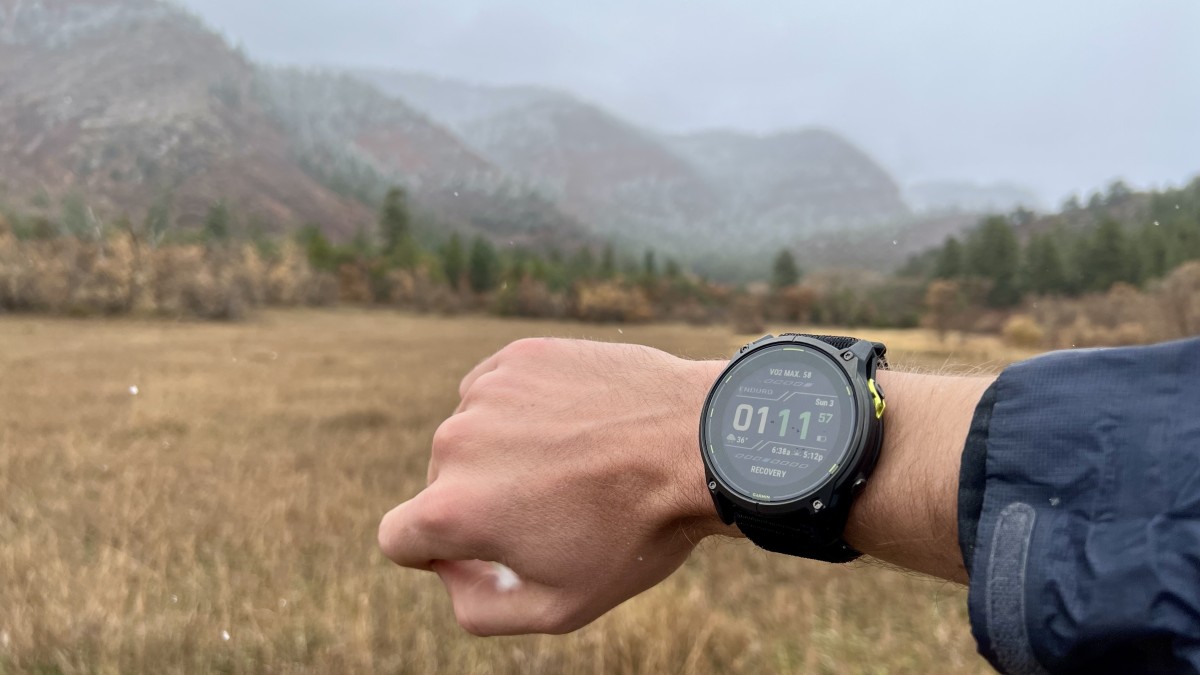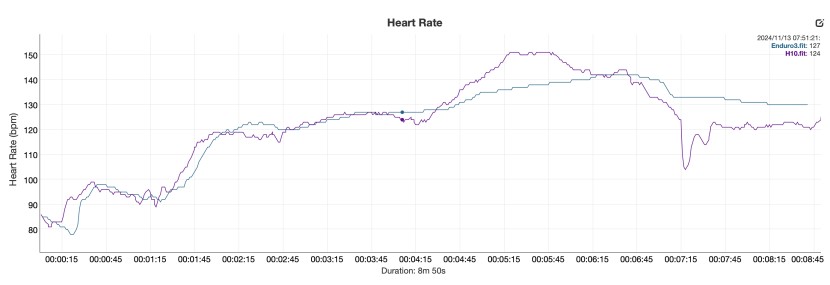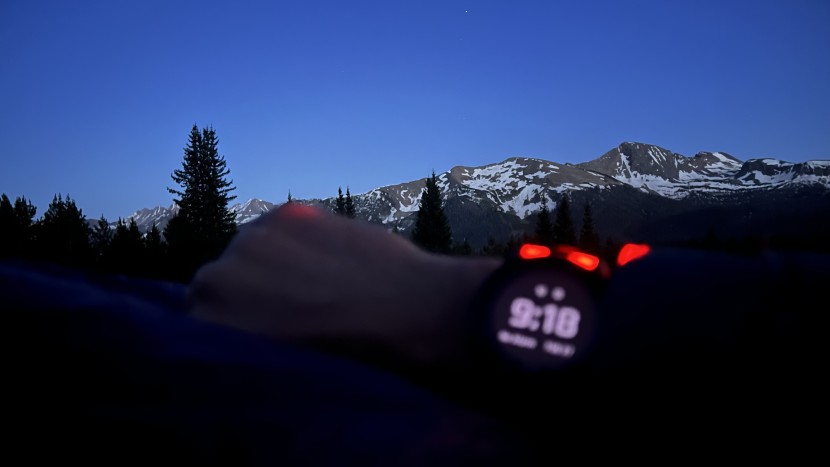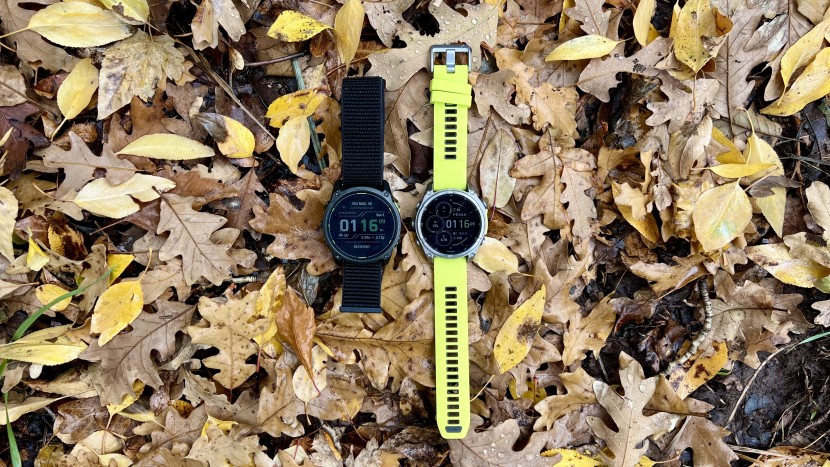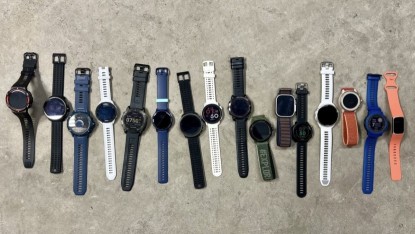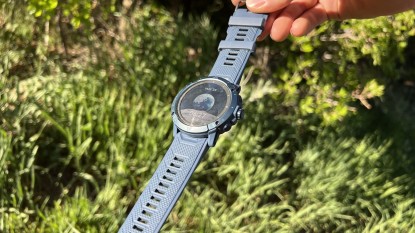Our Verdict
Compare to Similar Products
 This Product
Garmin Enduro 3 | |||||
|---|---|---|---|---|---|
| Awards | Best on Expedition | Best Smartwatch for iPhone Users | Best Overall GPS Watch | Great Value for a High-Quality GPS Watch | Best on a Tight Budget |
| Price | $900 List $899.99 at Amazon | $799 List $739.00 at Amazon | $587.99 at Amazon Compare at 4 sellers | $449.00 at REI Compare at 3 sellers | $229.00 at REI Compare at 3 sellers |
Overall Score  |
|||||
| Star Rating | |||||
| Bottom Line | With the best battery life and boosting solar charging this is one of the best for expedition or backcountry use | The second generation's software takes a backseat behind notable hardware upgrades, but this still remains our top-choice smartwatch | The 47mm case size offers great readability, and the slim design makes it feel featherweight on your wrist | Great craftsmanship and design with an updated UI, menu, and AMOLED display | This watch excels as an affordable GPS companion, offering value and dependable accuracy |
| Rating Categories | Garmin Enduro 3 | Apple Watch Ultra 2 | Garmin Forerunner 965 | Suunto Race | Coros Pace 3 |
| Accuracy (30%) | |||||
| Activity Use (20%) | |||||
| Everyday Use (15%) | |||||
| Extra Features (15%) | |||||
| Wearability (10%) | |||||
| Battery Life (10%) | |||||
| Specifications | Garmin Enduro 3 | Apple Watch Ultra 2 | Garmin Forerunner 965 | Suunto Race | Coros Pace 3 |
| Measured Body Diameter | 47 mm | 49.0 mm | 47.2 mm | 49.0 mm | 41.9 mm |
| Screen Type | MIP | Always-On Retina LTPO2 OLED | AMOLED | AMOLED | MIP |
| Measured Thickness | 17.5 mm | 14.4 mm | 13.2 mm | 13.3 mm | 11.8 mm |
| Measured Battery Life with GPS | 120 hours | 12 hours | 29 hours | 50 hours | 34 hours |
| Sensors Included | Heart rate, altimeter, barometer, compass, temperature, blood oxygen level | Heart rate, altimeter, barometer, compass, temperature, blood oxygen level | Heart rate, altimeter, barometer, compass, temperature, blood oxygen level | Heart rate, altimeter, barometer, compass, blood oxygen level | Heart rate, altimeter, barometer, compass, blood oxygen level |
| Measured Charging Time | 139 min | 96 min | 99 min | 84 min | 113 min |
| Measured Screen Width | 36 mm | 35.0 mm | 35.4 mm | 36.0 mm | 31.0 mm |
| Measured Weight | 3.00 oz | 2.60 oz | 1.90 oz | 2.93 oz | 1.50 oz |
| Battery Life Claims by Manufacturer | Smartwatch: Up to 36 days/90 days with solar Battery Saver Watch Mode: Up to 92 days/unlimited with solar GPS Only: Up to 120 hours/320 hours with solar |
Normal use: Up to 36 hours Low Power mode: Up to 72 hours |
Smartwatch mode; Up to 23 days GPS-Only mode without Music: 31 hours |
In time mode: 26 days With 24/7 Tracking and Mobile Notifications: 12 days Training mode with GPS: 40h / 50h / 70h / 120h |
Full GPS: 38 hours - 10 hours with music All Systems On: 25 hours - 9 hours with music Dual Frequency: 15 hours - 7 hours with music Daily Use: 17 days - 15 days with daily stress monitors |
| Navigation | Detailed, back to start | Detailed, back to start | Detailed, back to start | Detailed, back to start | Breadcrumb, back to start |
| Music Options | Control, storage | Control, storage | Control, storage | Control only | Downloaded control, storage |
| Touchless Payment | Yes | Yes | Yes | No | No |
| Sleep Tracking | Yes | Yes | Yes | Yes | Yes |
| Water Resistance (Max Depth) | 100m | 100m | 50m | 100m | 50m |
| Main Software App | Garmin Connect | Apple Health | Garmin Connect | Suunto | Coros App |
| Compatible with Other Software Ecosystems | Yes | Yes | Yes | Yes | Yes |
| Watch Face Material | Power Sapphire | Flat sapphire crystal display | Corning Gorilla Glass 3 DX | Sapphire crystal | Mineral Glass |
| Battery Type | Rechargable lithium ion | Rechargable lithium ion | Rechargable lithium ion | Rechargable lithium ion | Rechargable lithium ion |
| Bezel Material | Titanium | Titanium | Titanium | Stainless steel | Glass fiber reinforced polyamide |
| Case Material | Fiber reinforced polymer with titanium rear cover | Titanium and ceramic | Glass fiber reinforced polyamide | Glass fiber reinforced polyamide | Glass fiber reinforced polyamide |
| Strap Material | Ultra light-weight elastic nylon hook and loop | Spandex/polyester | Silicone | Silicone | Silicone |
| Tools Required to Change Band | No | No | No | No | No |
| Model Tested | Standard | Standard | Standard | Stainless steel | Standard |
| Size Tested | 51 mm | One size only | One size only | One size only | One size only |
| Warranty Offered | 1 year | 1 year | 1 year | 2 year | 2 year |
Our Analysis and Test Results
The Garmin Enduro 3 maintains its award for expedition usage, and it's our recommendation for those who are serious ultra athletes. This update is lighter, easier to read, and cheaper than the previous version while almost doubling the effectiveness of solar charging. Previously, it was a toss-up between the Fenix series and the Enduro. The Fenix series is still a great product, but its unneeded and arguably unwanted additions have made it incredibly cost-prohibitive for us to recommend.
The main downside of the Enduro 3 is that it's only available in a 51mm case size. This is going to be a dealbreaker for some people. However, we continue to be impressed by the fit, comfort, and weight of the model. While the price is reduced, it is worth noting that the unit now only comes with the UltraFit nylon knit loop strap. With up to 320 hours of solar GPS recording, a durable titanium body, and improved screen resolution, this is the best Enduro to date and should last you for years to come.
Accuracy
We calculated our accuracy score by evaluating both the GPS chipset and heart rate sensor in each watch. For GPS testing, each watch was used to complete a known 2.8-mile course, with the recorded distance compared against the exact 2.8-mile benchmark. For heart rate testing, we wore a watch on each wrist and ran a 0.5-mile distance, then compared the recorded data to the Polar H10 chest strap, a scientifically validated device for heart rate accuracy. The accuracy results from both tests were averaged to provide an overall score. GPS tests were conducted on the same day to ensure consistent weather conditions, while heart rate tests involved equal watch tightness to maintain a standardized fit. All data was then exported and timestamp-matched, allowing for a direct comparison between the chest strap and each watch's performance.
Thanks to the dual-frequency and MULTI GNSS capabilities, this watch could easily locate satellites, even in s technical terrain which is notoriously bad due to its more limited line of sight. We experienced minimal data inaccuracies, and when tested against our lineup, the Garmin Enduro 3 reached the same distance at the end of our test activity — just 0.04 off from 2.80 miles. The 5th gen Garmin sensor shines, averaging +/- 3.20 BPM accuracy during HR testing.
Activity Use
The Enduro 3 has the biggest screen of any of the watches we've tested. This benefits the user by allowing them to fit more data fields into a single data page without cramming so much that it makes it difficult to read. When comparing the 6 field data page on the Fenix 8 vs Enduro 3, the readability improvement on the Enduro 3 is noticeable. Our lead tester, Matthew, likes to interact minimally with the watch, and while he previously preferred the 47 mm Fenix, it's this readability that makes him now prefer the larger Enduro. The larger Fenix 8 Solar 51 mm matches the screen size and resolution of the Enduro 3.
This latest iteration has all of the features of the more premium Fenix 8 series besides the dive modes and speaker/microphone. All other major hardware and software features remain consistent between the models. Detailed maps, sports modes, and settings all have subtle updates to make them easier to use in the field. You also get all of the available Garmin sensors for the most information during activity (altimeter, barometer, thermometer, compass, blood oxygen, GPS, and heart rate).
The strong suit of the Enduro 3 is also its main downside. The size can feel a bit bulky for faster-paced efforts. We'd opt for the Enduro for mountain and ultra sports, for more fast-paced running efforts we'd opt for a lighter watch with a smaller footprint. The best part of the GPS market these days is sport and activity use is optimized across brands and models. Price difference often comes down to batteries, premium materials, and items outside of this metric. That being said, we find the Enduro to offer the best performance across every sport, and if we had to pick one watch for its activity performance, it would be this one.
Everyday Use
Garmin has excelled in producing hardware for the sports realm and, for years, has prioritized usability, durability, and performance. While Garmin has maintained its edge in features, the competition these days continues to be most noticeable in the software realm. The main competitor in terms of software is the Apple Watch Ultra 2. Garmin and the Enduro series are still the standout winners for athletes and those focused on all-day health metrics.
While there is a lot to consider for everyday use, there are three main items that stand out that we'll touch on here. Mode of interaction, daily health stats, and the mobile companion application. For more information on our testing, check out our testing process.
Garmin's blend of touchscreen and physical buttons offers the best of both worlds. The touchscreen excels at navigating maps, scrolling glances, and customizing settings, while the dedicated buttons ensure quick and reliable control of activities, data pages, and essential functions. Plus, these buttons can be customized with hotkeys for added convenience.
Health stats are extensive on the Enduro 3. The included sensors can track sleep, blood oxygen, stress, body battery, and recovery levels. These can then be viewed in glance pages or via the app where you can view your trends over time. All of these stats can help influence your training and recommend when you should take it easy or when you're likely ready for that hard workout. One unique aspect offered by Garmin is the performance condition that will notify you at the start of each workout. Oftentimes, this accurately predicts how you're already feeling, but it's nice to have that assurance that today is a day to take it easy.
The recently updated Garmin Connect app has a better UI that presents your data in an easier-to-understand format. You can access your recent activities, view daily health data, and edit settings on your watch. Garmin does a great job of implementing these stats throughout the app but allows you to access all of the same information via the watch. This is also where you can access your courses, which can be sent to your watch for navigation. The ability to add GPX files to the app is great for when you make a route on the fly or get AirDropped the GPX file before the start of an adventure. With so many features, the application can be overwhelming at first, but after some time, the extensive feature set becomes easier to use.
Extra Features
As watches continue to get more expensive, it's nice that Garmin is giving users options. The Enduro is built for users who want the best of the basics plus the extras that make Garmin so well-loved. You get all of the health sensors and software features of the more expensive models, but you also don't pay for voice assistant and dive modes. Sure, this watch is only two hundred dollars cheaper, but at this price point, every little bit counts.
Garmin offers a range of customizable stat widgets and convenient tools that are readily accessible on their watches. This seamless access enhances user experience, allowing quick adjustments like activating battery-saving modes or toggling the touchscreen on and off. The widgets provide valuable data visualization and enable interaction with connected devices such as a Garmin inReach. Pairing also gives you the ability to see your messages in the Garmin Messenger glance.
Notable Features:
- Flashlight
- Heart rate monitor
- Compass
- Thermometer
- Alarms
- Multiple activity profiles
- Pedometer & calories burned
- Barometer
- Altimeter
- Sunrise/Sunset information
- Breadcrumb navigation and topo maps
- Course creation and upload options
- Customizable watch faces
Head over to the Garmin website to see the full scope of all the offered features.
We appreciate the “resume later” feature, allowing the watch to function normally during workout breaks. This means you can pause your activity, run errands, and then easily resume your workout without interrupting the watch's regular functions.
Lastly, we can't overstate the handiness of the flashlight. Garmin remains the only option if you want this feature, and it's well worth it, especially in the backcountry. By double-tapping the light key, the flashlight turns on, and now the software UI allows you to change the beam brightness without switching to a new screen. This means you can now functionally use the watch while adjusting the modes of the flashlight.
Wearability
Unlike some other Garmin models, which come in multiple sizes, the Enduro 3 comes in one iteration of a 51 mm case size. When we first tested the Enduro 3, its lighter weight was noticeable on our wrists. While thicker than the Fenix series, it's lighter than the 51 mm Fenix models, having an identical weight to the 47 mm Fenix 8 Solar. The Enduro sports sapphire glass, like all Garmin solar models, and a titanium body. The watch is sleek and rugged but not overly flashy or aggressive. There are some slight green accents, but otherwise, the watch is unassuming except for its size.
The removable knit loop watch strap is the only option included with this iteration. While we find this strap to be comfortable and durable, we prefer the silicone option. While the price was reduced on this version you can expect to add about $50 if you want a Garmin-branded silicone strap. These straps are backward compatible with other 51 mm Garmin case-size models. For those who find the 51 mm case size too large, we'd recommend checking out other options in our lineup.
Battery Life
The Enduro 3 boasts the best battery life out of all the models we've tested. We tested a fully charged unit and left it in GPS mode, where it achieved 120 hours of GPS tracking. With solar tracking, Garmin claims up to 320 hours with 50,000 lux conditions. This updated version of the Enduro has redesigned the solar charging, and there is no longer a solar ring around the display. Garmin has managed to put the charging capabilities beneath the display which allows for a larger resolution in the same case size. This also improved the overall clarity of the display, slightly improving it over the previous version.
This excellent battery life is why it received our expedition top pick award. For serious athletes and backcountry users who plan to be gone for weeks at a time, the Enduro 3 should be at the top of your list. For ultra distances, it's nice to have charging to be one less thing to worry about. For thru-hiking or long-distance trails, having turn-by-turn is an excellent addition to more detailed mapping via your phone. Previously, you'd have to decide between preserving battery life and navigation, which is no longer the case.
Should You Buy the Garmin Enduro 3?
The Enduro series is the only time in recent memory where a product update has reduced in price while improving. We highly recommend this watch for serious athletes and those who previously were Fenix fans. Don't let the 51 mm case size deter you — it's comfortable and secure while offering better readability and better battery. The main reasons to choose a Fenix series are if you need a microphone/speaker and dive capabilities. We imagine this is a microscopic subset of our readers, so we recommend the Enduro over the Fenix series. The Garmin watches continue to offer the best accuracy, feature set, and usability — and the Enduro 3 is no different. If you're an ultrarunner, backcountry skier, or thru hiker, the Enduro 3 is the watch for you.
What Other GPS Watches Should You Consider?
The Garmin Forerunner 965 is our top pick for most users. Its sleek design, impressive battery life, and reasonable price point make it an excellent choice. While not as rugged as the Enduro 3, it still delivers a comprehensive feature set. For those who prefer MIP displays, the Fenix 8 Solar is the best option within the Garmin ecosystem at this performance level. If you're looking for a smaller watch, consider the Coros Apex Pro 2 or the 49mm Suunto Race.


